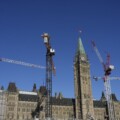In the past three decades, especially between 2019 and 2023, the average Canadian family’s tax bill has grown significantly more than what they’ve paid for shelter, food, or clothing.
Between 1992 and 2023, the average tax bill for the average Canadian family rose by $29,376 (166 percent) to $46,998, according to a recent research paper entitled “The Canadian Consumer Tax Index,” published by the Fraser Institute.
Between 2019 and 2023 alone, the average Canadian family's cumulative taxes rose $7,606. For comparison, between 1992 and 2020, families' tax bills grew by a four-year average of $2,896.
The think tank’s measurement of the average annual tax bill includes personal income taxes as well as payroll taxes, sales taxes, and taxes on property, profits, imports, natural resources, vehicles, and tobacco. The study also attributes corporate income taxes to households because the costs are passed on through higher prices and lower salaries.
During the four-year period between 2019 and 2023, payroll taxes and personal income taxes were the key drivers behind the rise in the cumulative tax bill, according to the Fraser Institute's calculations.
"The bulk of the increase in the tax bill is occurring at the federal level. There’s been a 28.1 percent nominal increase in federal taxes paid by the average family between 2019 and 2023," Jake Fuss, director of fiscal studies for the Fraser Institute told The Hub in an email. During the same years, provincial taxes rose 14.4 percent.
In 2020, declining tax revenues and an increase in family incomes caused the average tax bill to drop temporarily. The years following saw the tax bill increase and exceed pre-COVID levels, as the economy recovered and government revenues rebounded, wrote the author of the Fraser bulletin.
While it's difficult to discern the precise policy changes behind the rising tax burden, Fuss said the recent increases in payroll tax rates by the federal government are likely a contributing factor. He added that between 2015 and 2022, the federal government's decision to lower the second-lowest personal income tax rate along with their removal of several tax credits, caused 86 percent of middle income families to pay more income taxes. This "does help explain why income tax bills have generally risen over the last eight years or so," he said.
From 1992 to 2023, food and shelter saw increases of 109 and 147 percent, respectively, while the discretionary spend on clothing rose by just 13 percent.
The average Canadian family currently spends 43 percent of their $109,235 income on taxes and 21 percent on shelter, both of which are well within the historical average back to 1992, according to the most recent data of the report. Between 1992 and 2023, their average expense on food as a share of income fell from nearly 14 percent to 11 percent. Clothing fell from five percent to two percent.
As of 2019, Canada experienced a remarkable increase in the average family’s spending on taxes and necessities. After that year, discretionary spending on clothing was the only expense that fell.
Between 2019 and 2023 the average shelter cost rose $3,988 and food costs rose $1,911. Looking back to 1992, the average four-year increase for shelter and food was $1,508 and $703. This means that shelter and food costs are rising at a greater pace than the historic average, likewise with taxes but not by nearly as much, in dollar amounts.
In the past five years the average Canadian family’s spending on clothing, meanwhile, fell by $800. That’s a substantial shift (a decline of over 600 percent) from 1992 to 2020’s average four-year spending increase of $148. Clothing, being discretionary, represents spending that can be made only after necessities are met.
Between the numerous tax jurisdictions of Canada and the United States, Canada’s top marginal tax rates are the highest across the board according to previous Hub reporting.









